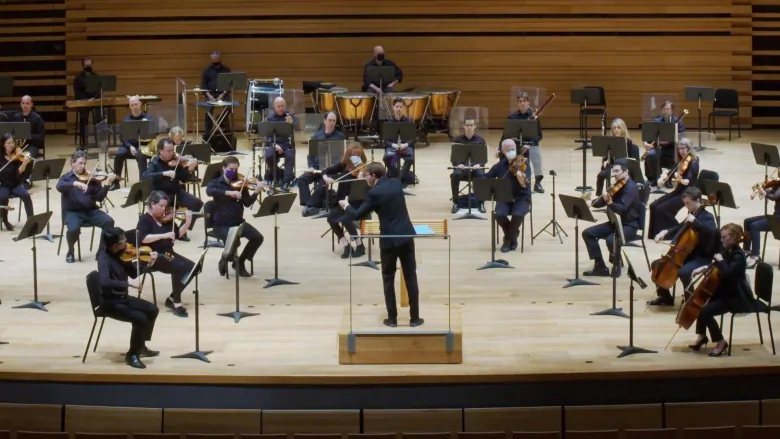- Details
- Category: News

Ruth Budd died on June 30, 2021 at age 97. This interview by Matt Heller was published in Una Voce, April 2013.
Before there was an OCSM or a Symphony Six, there was a school orchestra in Winnipeg with a problem. “The person who was playing the bass either broke his leg or his arm on the football field,” recalls Ruth Budd, who was a 16-year-old violinist at the time. “The conductor said, ‘Who would volunteer?’ and I said I would! He said, ‘Don’t be silly. You know a girl couldn’t play the bass.’”
- Details
- Category: News
May 2021: Conductors on the move, musicians host radio, and institutions building back better. Photo: Conductor Nicolas Ellis

- Details
- Category: News
It is now almost an entire year since I last played an orchestral concert. I believe this is the longest I’ve gone without playing one in my entire post-pubescent life.
- Details
- Category: News
This week, more on how COVID-19 has affected the arts in general and musicians in particular; the streaming wars; the Metropolitan Opera furlough; and the death of James Levine. (Image: from Toronto Symphony/Against the Grain Theatre's Messiah/Complex)

- Details
- Category: News
by Michelle Zapt-Belanger
In April 2020, the Thunder Bay Symphony Orchestra held two entirely digital, contactless auditions.
- Details
- Category: News
by Robert Fraser, OCSM President
It is difficult to believe the OCSM executive last met face to face in Toronto on February 22–23, 2020, just over a year ago.
- Details
- Category: News
by Matt Heller, with Tamsin Johnston and Miles Newman
When it comes to Collective Agreements (CAs), there’s one thing to note about notice: it’s everywhere. You could fill a rather large spreadsheet with all the notice requirements from an average CA, (If you do this, please send it to me.) So let’s start by getting more specific.
- Details
- Category: News
 This week: taking stock amid the crisis; notable performances; and a new MD in Montreal.
This week: taking stock amid the crisis; notable performances; and a new MD in Montreal.
- Details
- Category: News
 With 2020 at an end, we sample recent coverage of the pandemic’s economic impacts on the arts industry, as well as the arts industry's size and importance to the larger economy. (Photo: OSM's return to the stage, June 8, 2020)
With 2020 at an end, we sample recent coverage of the pandemic’s economic impacts on the arts industry, as well as the arts industry's size and importance to the larger economy. (Photo: OSM's return to the stage, June 8, 2020)
Unemployment has affected the arts even more deeply than restaurants and other hard-hit industries, the NY Times reports. Even well-known soloists, such as violinist Jennifer Koh, have resorted to public assistance programs. Adam Krauthamer, president of AFM Local 802 (New York City), warns that careers could be lost, potentially leading to a great cultural depression.
Another NY Times report focused on pandemic concessions, including major pay cuts at the New York Philharmonic, Boston Symphony, and National Symphony. Stagehands at the Kennedy Center and Metropolitan Opera are locked out, and Met Opera musicians are in tense negotiations. ICSOM chair Meredith Snow noted many examples of cooperation, however: “There is more of a recognition that we need to be a unified face to the community, and that we can’t be squabbling or we’re both going to go down.
The arts industry contributes more to the US economy than agriculture, transportation, or warehousing, according to a 2019 study by the US Bureau of Economic Studies and the National Endowment for the Arts, ArtsNet reported. The study also found the arts growing slightly faster than the economy as a whole.
Statistics Canada’s most recent Provincial and Territorial Cultural Indicators report (2018) found a similar increase in the Canadian arts sector, even as the publishing industry experienced ongoing losses.
Major think tanks such as Brookings and Center for Strategic & International Studies released reports on the pandemic’s effects on arts and culture, and proposals to rebuild a more resilient creative economy.
European arts institutions, which had begun to rely more on private and corporate giving, have largely weathered the pandemic thanks to government bailouts, the Economist reports. Some see the crisis as an opportunity to move away from a mega-tourism model that turned city centres into “theme parks”.
The Calgary Herald published a year-in-review feature on the local arts scene in 2020, marked by ongoing struggles to sustain and innovate.
Compiled by Matt Heller, with assistance by the OCSM Editorial Committee. Do you have a story or comment to share? Please send to This email address is being protected from spambots. You need JavaScript enabled to view it. and I’ll include them in an upcoming news bulletin. Happy new year and best wishes for 2021!
- Details
- Category: News
 This week, we delve into recent coverage of diversity in the arts, along with some noteworthy readings and resources.
This week, we delve into recent coverage of diversity in the arts, along with some noteworthy readings and resources.
The New Yorker’s Alex Ross published an essay, Black Scholars Confront White Supremacy in Classical Music (Sept. 21, 2020), tracking missed opportunities and renewed efforts to de-marginalize non-white composers and performers.
In July 2020, The New York Times published an Arts feature, “How to Change Classical Music”:
- The Times posed the question of nine Black performers and composers.
- Anthony Tommasini argued in a Critic’s Notebook column “To Make Orchestras More Diverse, End Blind Auditions”.
- Tommasini’s article generated a lot of reaction, including a Pittsburgh Post-Gazette column by Jeremy Reynolds, arguing “Orchestra auditions should be more ‘blind’, not less”.
- In another Critic’s Notebook column, Josh Barone argued “Opera Can No Longer Ignore Its Race Problem”.
NYC musicians Shea Scruggs and Weston Sprott took a broad look at the symphonic hiring process in a June 2019 article for Local 802’s Allegro newsletter, “Advancing Inclusion: Creative ways musicians can take a lead”.
Orchestras Canada has a number of initiatives under the banner of IDEA (Inclusion, Diversity, Equity, and Accessibility):
- Orchestras Canada’s IDEA Declaration was approved in May 2017 and signed by many arts organizations, including OCSM.
- A June 2020 statement on racial inequity followed up on that Declaration.
- Re-sounding the Orchestra, a major report by Soraya Peerbaye and Dr. Parmela Attariwala, was released in 2019, and includes responses and action items.
- Perfect Fifth of Diversity: A framework for self-assessment, by Daniel Bartholomew-Poyser (pictured above), poses five key questions for orchestras to consider.
- Orchestras Canada Equity Coordinator Nina Jeftic compiled a list of noteworthy IDEA readings in June 2020.
The Institute for Composer Diversity provides a variety of resources, analysis, and advocacy for diverse programming. Their database is currently being reworked, with plans to relaunch in the next few weeks.
“Our stages are not reflective of our population - but this moment is an opportunity to elicit change,” writes dancer/choreographer Kevin A. Ormsby in an essay for CBC Arts, “Pause. Reflect. Rebuild. How the dance world can rise from the ashes of 2020”.
Both Ormsby’s article and a 2018 essay in canadianart, “The Great Canadian Amnesia” by Zainub Verjee, examine the legacy of the 1951 Massey Commission Report, which set federal arts and culture policy and granting models still operating today, including the idea of “Canadian content”.
Compiled by Matt Heller, with assistance from the OCSM Editorial Committee. Please send your comments and suggestions to This email address is being protected from spambots. You need JavaScript enabled to view it.. Thank you!
Page 3 of 4


